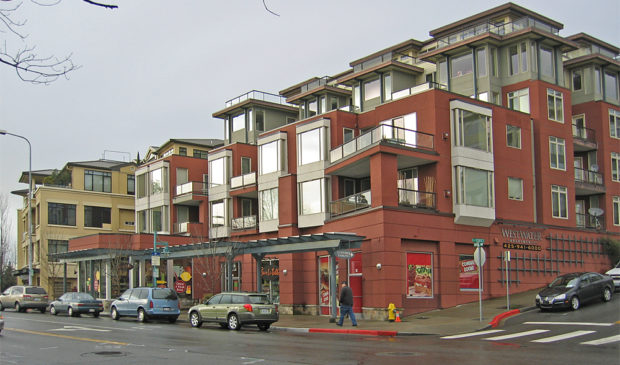Specter of CodeNEXT informs vertical mixed-use cases at Planning Commission
Friday, January 13, 2017 by
Joseph Caterine In two separate cases on Tuesday, the Planning Commission approved vertical mixed-use zoning on Congress Avenue. The majority of the commissioners continue to see VMU zoning as a way to increase density along or near core transit corridors in line with the goals of Imagine Austin and CodeNEXT.
The first applicant, Guefen Development Company, applied to develop 4714 South Congress Ave. The second, LEMCO Holdings LLC, owns 4411 South Congress Ave. and 4510 Lucksinger Lane. “It’s a prime example of what we need to do,” Commissioner James Schissler said at the meeting. “Putting more density on arterials in the city.”
In particular, anticipation of CodeNEXT’s drafting process, which begins Jan. 30 with release of the draft text, made commissioners reluctant to “hold zoning hostage,” in the words of Chair Stephen Oliver.
“This is an activity corridor,” Commissioner Fayez Kazi said. “And if we’re not ready for this conversation now, with CodeNEXT adding density to these corridors, then we’re not ready at all.”
But what would the cost be for accommodating the growth promised by CodeNEXT, asked Commissioner Karen McGraw. “The corridor already has (mixed-use) zoning,” she said. “We’re not stopping development. We’re simply saying that we’re not going to give them all these perks to do a few affordable units and some retail that may not be needed.”
Oliver concurred. “Just because we want VMU everywhere doesn’t mean the market will support it,” he said.
Besides increased density, vertical mixed-use also requires a minimum of 10 percent of the residential units be affordable. In both cases, the respective developers agreed that 10 percent of the units would be at 60 percent of the median family income.
Mario Cantu, one of the speakers in opposition to both cases, challenged the value of the affordability negotiated. He urged the commissioners not to be pushovers in their dealings with developers when it came to affordable housing. “It’s time to stick out your neck and tell (these developers) no,” he said. “We’ve got to start hitting these developers with the stick, and we’ve got to stop giving them carrots.”
In response, Commissioner Tom Nuckols clarified that the commission did not have much of a stick in these kinds of cases. “With Plaza Saltillo they were requesting CURE zoning, which gives (City) Council and us a lot of flexibility on what we can require,” he said. “Here, we’re limited to what’s already in the code.
“If we get a half a loaf, is it better to take half a loaf,” Nuckols continued, “or tell somebody no, we don’t want any affordable housing at all.”
“If that’s the case,” Cantu fired back, “then each and every one of you need to ask (the) CodeNEXT (team) how can we get a loaf and a half?”
Regardless of how much affordable housing should be required in these cases, Commissioner Chito Vela raised the concern of what assurance the commission had that these agreements about the specific number of affordable units made during deliberations are being followed whenever the units are actually available.
“I’ve been on commission for two years,” he said, “and I’m very uncomfortable as to who is overseeing this and whether it’s actually happening. Are we actually getting what we’re bargaining for?”
Schissler made a motion to approve the first case with staff recommendation, and Commissioner Michael Wilson seconded. The motion passed 12-1, with Commissioner Patricia Seeger dissenting. In the second case, Kazi made a substitute motion to approve the application with staff recommendations, and Vela seconded. The motion passed 10-2, with McGraw and Seeger dissenting and Schissler absent.
In both cases, friendly amendments were accepted for the mix of affordable housing stock to reflect the makeup of the rest of the developments, and to include conditions that the developers agreed to with the commission’s recommendation.
Photo by Brett VA made available through a Creative Commons license.
The Austin Monitor’s work is made possible by donations from the community. Though our reporting covers donors from time to time, we are careful to keep business and editorial efforts separate while maintaining transparency. A complete list of donors is available here, and our code of ethics is explained here.
You're a community leader
And we’re honored you look to us for serious, in-depth news. You know a strong community needs local and dedicated watchdog reporting. We’re here for you and that won’t change. Now will you take the powerful next step and support our nonprofit news organization?










